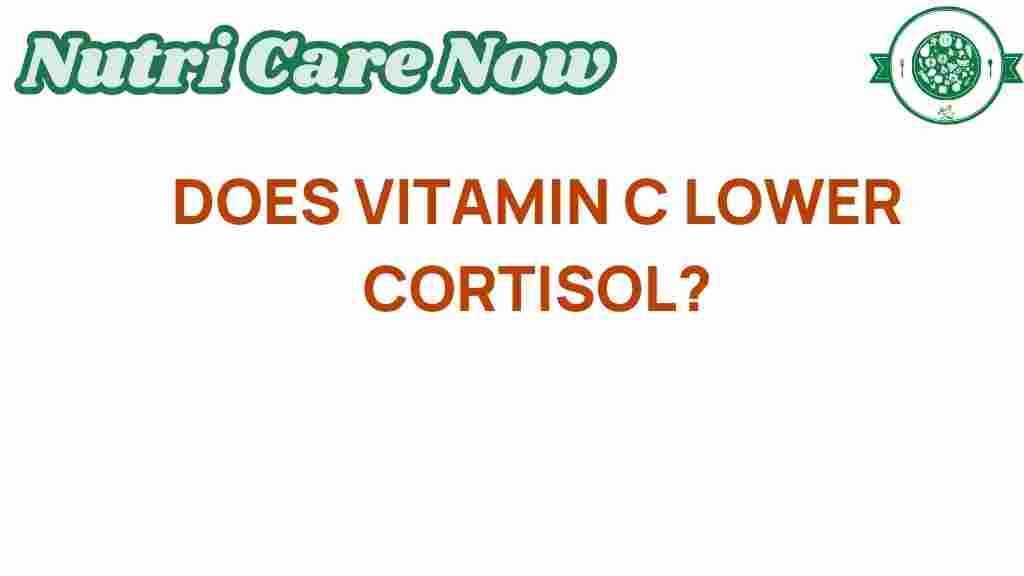The Surprising Connection: Does Vitamin C Lower Cortisol Levels?
In the realm of nutrition and wellness, few topics garner as much attention as the relationship between vitamins, stress, and overall health. Among the various nutrients that play a role in our well-being, Vitamin C stands out for its numerous health benefits, particularly in the context of cortisol levels and stress reduction. This article delves into the fascinating connection between Vitamin C and cortisol, exploring how this essential nutrient can support our adrenal health and contribute to a more balanced life.
Understanding Cortisol and Its Impact on Health
Cortisol, often referred to as the “stress hormone,” is produced by the adrenal glands and plays a crucial role in various bodily functions, including:
- Regulating metabolism
- Controlling blood sugar levels
- Reducing inflammation
- Assisting with memory formulation
While cortisol is vital for maintaining homeostasis, chronic elevated levels due to prolonged stress can lead to a range of health issues, including:
- Weight gain
- Sleep disturbances
- Weakened immune function
- Anxiety and depression
Understanding the factors that influence cortisol production is crucial for managing stress and promoting overall wellness.
The Role of Vitamin C in Stress Reduction
Vitamin C is a powerful antioxidant that helps protect the body from oxidative stress and supports the immune system. Recent studies suggest that Vitamin C may also play a significant role in reducing cortisol levels. Here’s how:
- Antioxidant Properties: Vitamin C neutralizes free radicals, reducing oxidative stress that can lead to increased cortisol production.
- Adrenal Health: The adrenal glands rely on Vitamin C for the synthesis of cortisol. Adequate levels of Vitamin C may help regulate cortisol production.
- Stress Response: Supplementation with Vitamin C has been shown to lower cortisol levels in response to stress, making it a potential ally in stress management.
These mechanisms suggest that incorporating Vitamin C into your nutrition may provide significant stress reduction benefits.
Health Benefits of Vitamin C
Beyond its potential role in lowering cortisol, Vitamin C offers numerous health benefits, including:
- Immune Support: Vitamin C enhances the function of immune cells, helping the body fight off infections.
- Skin Health: It promotes collagen production, contributing to healthy, youthful skin.
- Heart Health: Antioxidant properties support cardiovascular health by reducing oxidative stress on blood vessels.
- Enhanced Iron Absorption: Vitamin C improves the absorption of iron from plant-based foods, preventing anemia.
Incorporating sufficient Vitamin C into your diet can not only aid in managing cortisol levels but also enhance your overall health and well-being.
Sources of Vitamin C
To reap the health benefits of Vitamin C, consider adding the following foods to your diet:
- Citrus fruits (oranges, lemons, grapefruits)
- Berries (strawberries, blueberries, raspberries)
- Kiwi
- Bell peppers
- Broccoli
- Brussels sprouts
- Tomatoes
In addition to these food sources, Vitamin C is also available in supplement form. If you’re considering supplements, consult with a healthcare professional to determine the right dosage for your needs.
Step-by-Step Process: How to Use Vitamin C for Stress Reduction
To effectively use Vitamin C as part of your wellness routine, follow these steps:
- Assess Your Intake: Evaluate your current Vitamin C intake from both food and supplements.
- Incorporate Foods: Aim to include a variety of Vitamin C-rich foods in your daily meals.
- Consider Supplements: If dietary sources are insufficient, consider adding a Vitamin C supplement after consulting with a healthcare provider.
- Monitor Stress Levels: Keep track of your stress levels and overall well-being as you increase your Vitamin C intake.
- Adjust as Needed: If you experience a reduction in stress and improved energy, continue with your regimen. If not, reassess your intake and lifestyle factors.
Troubleshooting Tips for Maximizing Vitamin C Benefits
While Vitamin C is generally safe, here are some troubleshooting tips to ensure you’re getting the most out of this essential nutrient:
- Stay Hydrated: Adequate hydration is crucial for nutrient absorption and overall health.
- Combine with Nutrients: Pair Vitamin C with iron-rich foods to enhance absorption.
- Avoid Excessive Sugar: High sugar intake can lead to inflammation, counteracting the benefits of Vitamin C.
- Consult a Professional: If you have underlying health conditions, consult with a healthcare provider before starting any new supplement regimen.
Conclusion: Embrace the Connection Between Vitamin C and Cortisol
The connection between Vitamin C and cortisol presents an exciting opportunity for those looking to enhance their wellness and manage stress. By incorporating Vitamin C-rich foods into your diet and considering supplements where necessary, you can support your adrenal health and promote a balanced lifestyle.
As you embark on your journey to better health, remember that nutrition is just one piece of the puzzle. A holistic approach to wellness, which includes regular exercise, adequate sleep, and stress management techniques, will yield the best results.
For more insights on nutrition and wellness, check out this comprehensive guide on maintaining a healthy lifestyle. Remember, small changes can lead to significant improvements in your health and quality of life.
Embrace the health benefits of Vitamin C and take proactive steps toward reducing cortisol levels and enhancing your overall well-being.
This article is in the category Supplements and created by NutriCareNow Team
